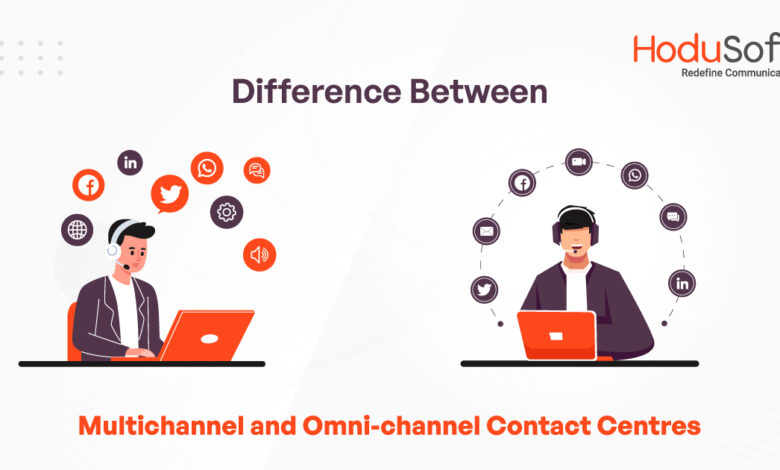Difference between Omnichannel and Multichannel Contact Centers

If you’re an owner of a call center (or a contact center), you must know this! The days when customers used to contact customer service departments of businesses are long gone. Today, an average customer uses more than ten different channels to contact businesses. Apart from voice calls, the other channels can be anywhere from video calls, text messages, instant messages, website chats, as well as social media.
That’s why if you are solely relying on your business phone system, then you need to consider using software that can support multiple channels and handle all customer interactions effectively and efficiently.
Now, when it comes to finding the most suitable software, you have two options to pick. One is sophisticated omnichannel contact center software that can provide a unified experience to your customers, the other is to have a multichannel contact center.
Omnichannel contact centers and multichannel contact centers—both of them may sound similar but are quite different from each other. This blog post explains both of them in detail and lists ten key differences between them. Read on to know more.
What is an omnichannel contact center?
As the name suggests, an omnichannel contact center is a contact center that handles outbound and inbound customer communications via a wide range of channels ranging from audio calls, video calls, live chats, emails, text messages, instant messages, social media, support ticket, and more.
An omnichannel contact center enables customers to have a seamless experience irrespective of the channels they use to contact your business. Whether they use the good old telephone system to speak with your customer service representative or use social media to get in touch with your business, they can get the same level of experience.
Fun fact: As per an industry stat, less than three percent of contact centers are deploying omnichannel while 97 percent of companies said that they are investing in omnichannel.
What is a multichannel contact center?
Multichannel contact center is almost similar to omnichannel contact center but the difference is unlike the omnichannel contact center, they are not integrated and connected (to the channels).
The contact center can handle inbound and outbound customer communications through multiple communication channels. The channels can include audio calls, video calls, text messages, live chat, emails, instant messages, social media, and more.
Each channel operates independently, meaning that the interactions and information on one channel may not be connected or shared with other channels. That’s why in multichannel contact centers, customer service representatives are usually unaware of the customer’s prior communications via other channels.
Differences between an omnichannel contact center and a multichannel contact center
Even though both omnichannel and multichannel contact centers are customer service models, they vary in several key aspects. Here are some of them:
1. Integration
Omnichannel contact centers seamlessly integrate multiple channels, such as phone, email, chat, social media, and SMS, into a unified system.
However, in multichannel contact centers all channels are present but not integrated. These contact centers operate each channel independently.
2. Focus
Omnichannel contact center is customer-focused. In an omnichannel contact center, the focus is primarily on the customer, and their convenience, needs, and preferences are taken into consideration. The main focus is to create a seamless, integrated customer experience across all channels.
Multichannel contact is brand-focused. In a multichannel contact center, the main focus is on the brand’s perspective and operational efficiency. Many businesses tend to optimize each channel individually without taking customer experience across channels into account.
3. Channel consistency and switching
Omnichannel contact centers maintain consistent customer experiences across all channels, which ensures a unified journey. Also, omnichannel contact centers allow customers to switch channels without losing context, enabling them to continue interactions seamlessly.
Multichannel contact centers may require customers to repeat information when switching channels. In addition to that, the contact centers may offer different experiences across different channels.
4. Channel interaction history
Omnichannel contact centers provide agents with a comprehensive view of the customer’s interaction history across all channels. In these types of contact centers, the channel interaction history encompasses the entire journey of customers across all channels. It gives a complete view of customers’ interactions including their queries, communication history, complaints, purchases, and other relevant data. Omnichannel contact centers gather data from various channels to gain deeper insights into customer behavior and preferences.
Multichannel contact centers tend to offer separate interaction histories for each channel. In these types of contact centers, the channel interaction history is typically limited to each specific channel. Each channel operates independently, and the interaction history is siloed within that particular channel. Because of siloed channels, multichannel contact centers tend to lack comprehensive customer insights.
6. Agent training
Omnichannel contact centers require agents to be trained in handling interactions across multiple channels, ensuring consistent support. Agents in an omnichannel contact center are equipped with tools and information to understand and serve customers better, no matter which channel they use. The emphasis is on building customer loyalty and satisfaction through a holistic and customer-centric approach.
Multichannel contact centers may have specialized agents for each channel. Agents in multichannel contact centers are often trained to specialize in specific channels such as phone, email, or chat. They receive focused training on the specific tools, techniques, and best practices related to their assigned channel to provide efficient and effective support. This specialization allows agents to develop expertise in their designated channels and deliver targeted assistance to customers.
7. Customer expectations
When customers call a contact center, they expect a seamless and consistent experience across all channels. The last thing any customer would want is to switch channels and repeat information. Omnichannel contact centers meet customers’ expectations for seamless and personalized experiences across all channels.
However, multichannel contact centers may not fully meet these expectations due to disconnected channels. These types of contact centers don’t offer a cohesive experience across channels as each channel doesn’t have the same level of integration or context as an omnichannel approach.
8. Scalability and flexibility
Omnichannel contact centers are more scalable as they provide a more integrated and comprehensive approach to customer communication and can handle a higher volume of interactions across various channels effectively. In these contact centers, all communication channels are interconnected, which enables seamless transitions between channels. To scale an omnichannel contact center, all you need to do is add resources to the central platform that handles all channels. Omnichannel contact centers can easily adapt to new channels, which makes them highly flexible.
Multichannel contact centers may face scalability challenges due to channel-specific limitations. That’s because multichannel contact centers have separate communication channels such as audio calls, video calls, text messages, instant messages, emails, live chats, and social media. To scale up (or scale down) a multichannel contact center, you need to add more resources such as agents, infrastructure, and other tools to every individual channel with the rise of interaction volume. Unlike omnichannel contact centers, multichannel contact centers cannot adapt to new channels that easily.
9. Customer satisfaction
How satisfied are customers with omnichannel contact centers? Here are some stats. As per data, omnichannel customers represent just seven percent of all customers they generate 27 percent of all sales. Another stat discovers that customer satisfaction rates are 23 times better for businesses using omnichannel tools. Another study found that more than a third of customers want to contact the same customer service representative on any channel.
Omnichannel contact centers aim to provide higher customer satisfaction by delivering a consistent and efficient service experience. After getting in touch with omnichannel contact centers, customers can switch between channels without losing context while agents can readily access their relevant information, past details, and history. This high level of personalization and integration results in higher customer satisfaction.
Multichannel contact centers may struggle to deliver consistent experiences, which can lead to disconnected experiences between channels and potential inconsistencies, leading to lower satisfaction. If customers switch channels they have to repeat information and find it difficult to receive the same level of tailored support across different channels as they would in omnichannel contact centers. The limited context and lack of integration may result in a decrease in customer satisfaction.
10. Real-time analytics and insights
Equipped with a centralized platform, omnichannel contact centers can collect and analyze data across all channels in one place. By doing so they provide a more comprehensive and unified view of real-time analytics and insights across all channels, which enables managers and supervisors to make data-driven decisions.
In multichannel contact centers, every individual channel has its own analytics and reporting tools that track key performance indicators (KPIs) specific to that channel alone. That makes it extremely challenging for these contact centers to gain a comprehensive view of real-time customer interactions and agent performance across different channels.
Summing up
To better decide if an omnichannel contact center or multichannel contact center is suitable for your business, you should consider some key things. The first thing is the volume of customer service. If you put a high value on customer experience, then omnichannel contact center software would be more suitable for your business. It would also be best suited for your business if you put high-value customer experience.
However, if you focus on high product volumes then multichannel contact center software would be more feasible for you. Also, multichannel contact center software is more affordable compared to its omnichannel counterparts.




